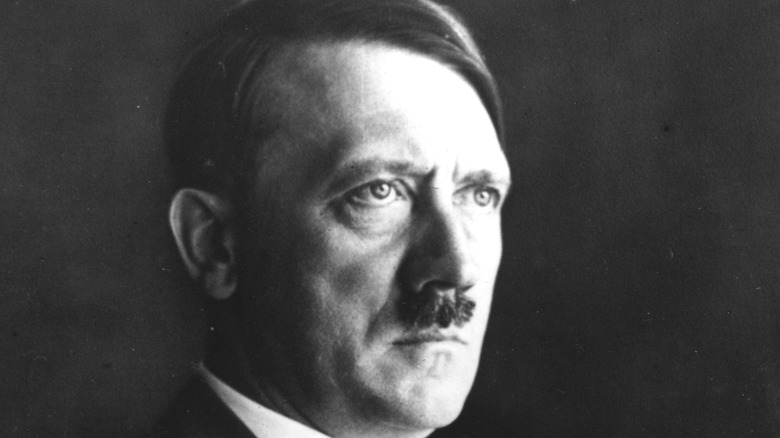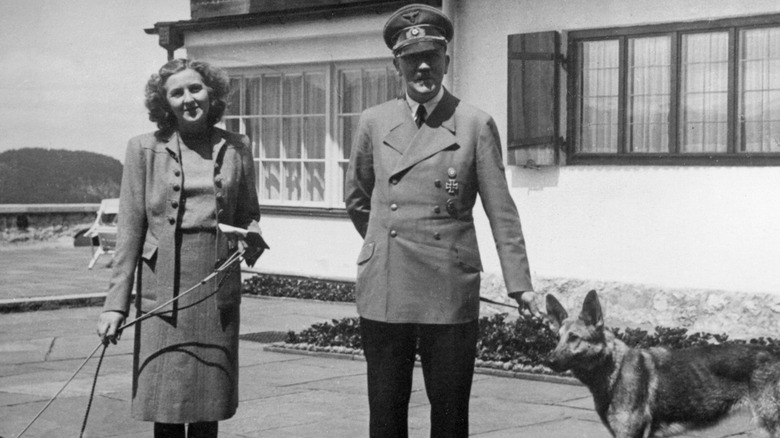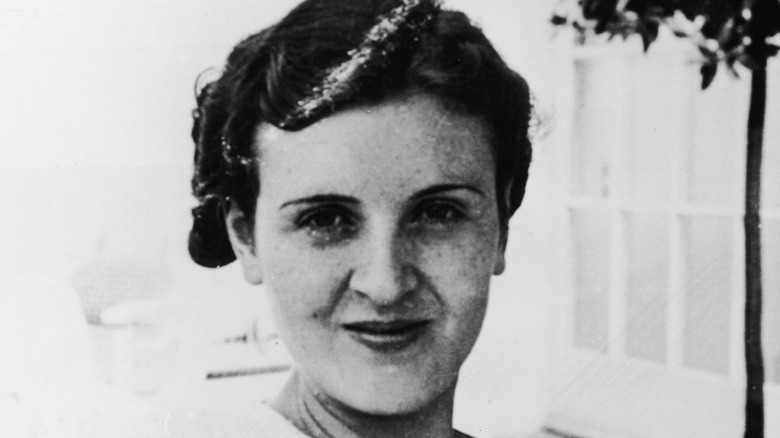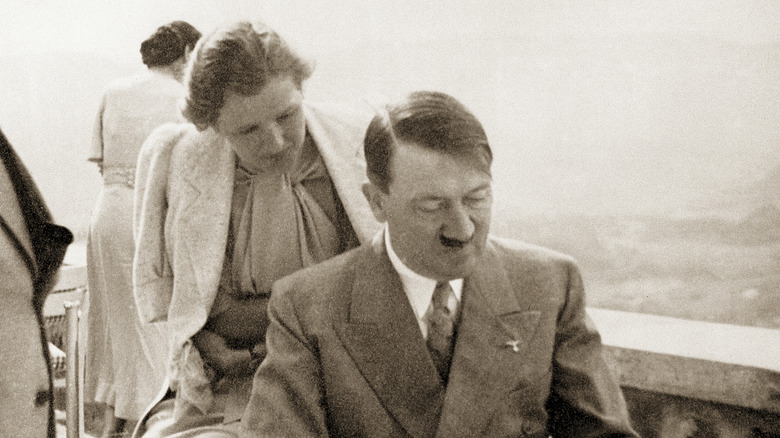Here's What Was Found In Hitler's Last Will
Nazi leader and German dictator, Adolf Hitler, committed suicide on April 30, 1945, by shooting himself in the right temple in a Berlin bunker as the British, Americans, and Soviets — all whom he and his regime had been at war with for years — were closing in on him. The day before ending his life, he married his longtime mistress, Eva Braun, who joined him in suicide by taking a cyanide pill while sitting next to him on the couch, according to History. To test the poisonous pills out, Hitler first fed one to his dog, Blondi, to make sure they worked. They did.
The day before Hitler's death, he dictated his final will and testament. Per the Jewish Virtual Library, Hitler's first order of business was to explain his motives for finally marrying his mistress of 16 years.
Hitler explained that he was too busy during all those "years of struggle" to be a proper husband. Now that he was losing the war and had decided to end his "earthly career," he would take as his wife a "girl who, after many years of faithful friendship, entered, of her own free will, the practically besieged town in order to share her destiny with me. At her own desire she goes as my wife with me into death. It will compensate us for what we both lost through my work in the service of my people."
According to The Washington Post, Braun had attempted suicide twice prior for Hitler's "attentions."
Hitler was a distant boyfriend but Braun was dedicated to him
By the time Adolf Hitler chose to end his life and take his longtime girlfriend and their dog with him, his regime had overseen the killing of an estimated 17 million people, according to Statista. The Nazi party sought to eliminate various ethnic groups, most commonly Jews, and others who were deemed tainted in some way — homosexuals, criminals, the disabled — to create an Aryan master race of people.
While his efforts are reviled today, and even were very much reviled by the world outside the Nazi party when Hitler was warring and killing innocents in order to manifest his maniacal fantasy, Eva Braun was dedicated to her lover, a man who doled out his affections in crumbs, leaving her always hungry for more. At least that's the way Braun made it sound in her 1935 diary entries published by the Jewish Virtual Library when she was just 23-years-old, 10 years before she chose to join Hitler in matrimony and death.
At the end of her anguished entries in want of Hitler's love and attention, she says she had written him one last time and if he didn't respond, she was going to take 35 unspecified pills and end her life, which, according to the Jewish Virtual Library, she did. Though the attempt was unsuccessful, it worked to get the Führer's attention. He even added her to his first will in 1938.
Adolf Hitler's 1938 will assumed he'd die before Eva Braun
In that testament, Braun was placed at the top, just like in his final will. According to the Jewish Virtual Library, if Hitler were to die, Braun would receive a certain amount of money per year for the rest of her life. For her part, she remained ever loyal to her romantically inept boyfriend, writing in a letter, "From our first meeting I swore to follow you anywhere — even unto death — I live only for your love."
According to the University of Chicago Press, Hitler wrote that early version of his will by hand and signed it on May 2, 1938. It's theorized he wrote that will not because he feared death by his enemies, but because he had fistulas and thought he might have cancer. That initial version of Hitler's will was only discovered in the "ruins of the Reichschancellery" in 1945, per the University of Chicago Press.
But his final will was written in an entirely different light. He knew in late April 1945 that he was beaten and had decided to end his life rather than face the consequences or be captured by enemies.
Since Braun chose to die with Hitler, his final will aimed to look after her mother
Since he didn't have children or Braun to worry about after he died, Hitler said in his final will that he wanted to leave his possessions to "the Party," per the Jewish Virtual Library. "Should this no longer exist, to the State; should the State also be destroyed, no further decision of mine is necessary," he wrote. Hitler also requested his collected photos be added to a gallery in his hometown, Linz on Donau.
He named his "most faithful Party comrade" Martin Bormann as executor. Bormann was tasked with working out what may have sentimental value to Hitler's family along with any resources to ensure they had enough "for the maintenance of a modest simple life." Above all, Hitler wanted to ensure Braun's mother and his "faithful" co-workers — specifically his secretary Frau Winter — were taken care of.
Hitler wrote that he and Braun chose death "in order to escape the disgrace of deposition or capitulation," adding that they wanted their bodies burned "immediately on the spot." According to The Washington Post, Hitler didn't want his body being put on view. His loyal aides secured at least 47 gallons of gasoline and burned Hitler and Braun's bodies until there was little left.



